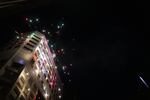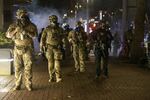During a military briefing Friday, President Trump indicated he sent federal law enforcement officers to Portland to quell the nightly protests over police violence, and claimed Portland police were incapable of managing the protests themselves.
In the wake of the killing of George Floyd by police in Minneapolis in May, hundreds and sometimes thousands of protesters in Portland have taken to the streets nightly, with demonstrations often ending when police use violence to disperse the crowds of mostly nonviolent protesters.
Last month, Trump signed an executive order to protect monuments and statues from protests nationwide as well as combat criminal activity. In response, the Department of Homeland Security sent officers to Portland; Seattle; Washington, D.C.; and Gettysburg National Park in Pennsylvania, according to a DHS official who spoke on background. The official wouldn’t discuss additional locations, specific agencies or units, but did say that hundreds of federal law enforcement officers were deployed to areas around the country as a result of Trump’s executive order.
“A lot of this was a big push for the July 4 weekend,” the official said. “We’re still in an enhanced posture. We’re prepared for if there is more violence, we’re ready to deal with it.”
Related: Q&A: Portland Commissioner Jo Ann Hardesty Thinks This Moment Will Last
The protests in Portland are largely centered around the Multnomah County Justice Center and the Mark O. Hatfield Federal Courthouse. The two buildings are next to one another in downtown Portland. Some protesters have thrown water bottles and shot fireworks near the buildings. Police and federal law enforcement have responded with indiscriminate use of tear gas, pepper spray and less-lethal impact munitions.
On Friday, Trump was attending a briefing at U.S. Southern Command in Doral, Florida about preventing the flow of drugs into the United States. About halfway through the briefing, Trump turned to Acting DHS Secretary Chad Wolf and asked for an update on the protests in Portland.
“We sent you there recently,” Trump said to Wolf. “It was out of control. The locals couldn’t handle it. And you people are handling it very nicely.”
The Portland Police Bureau and Portland Mayor Ted Wheeler, the city’s police commissioner, declined to comment on the president’s remarks.

Fireworks explode outside the Multnomah County Justice Center in Portland, Ore., July 4, 2020.
Jonathan Levinson / OPB
Wolf said DHS and the Department of Justice are “surging resources” in Portland. He told the president that has led to about a dozen arrests. The Department of Justice was not able to immediately verify that number.
“What we see in Portland is really a smaller example of what we see around the country regarding some of the civil unrest and the attacks on law enforcement,” Wolf said. “What you find in Portland is about five and a half weeks of continued violence against the federal courthouse.”
In addition to federal law enforcement officers already based in Portland, the federal government has sent officers from Customs and Border Protection’s Border Patrol Tactical Unit, known as BORTAC, and the U.S. Marshals Special Operations Group.
During Friday’s briefing, the protests in Portland were discussed for less than two minutes, before returning to drug enforcement. Wolf claimed there had been violence against officers in Portland. DHS later clarified Wolf was referring to fireworks shot toward officers as well as protesters pointing lasers at federal police. Several protesters in Portland were charged with assault on a federal officer because of those actions.
Wolf didn’t discuss the role officers have played in crowd control. On the Fourth of July, federal law enforcement, alongside PPB, cleared multiple city blocks west of the courthouse. In the days since, federal officers have swarmed individuals in Chapman Square, made arrests, then retreated back into the courthouse.
“We should have more support of the local police there,” Wolf said. “But again, the Department of Homeland Security, along with the DOJ, FBI and others are surging resources and we’re starting to make a difference there.”
The Department of Homeland Security was established after 9/11 to address the United States’ vulnerability to terrorist attacks. BORTAC is typically deployed on the border and used in high-risk operations targeting drug smugglers and known violent criminals. Protecting the federal courthouse and statues from protesters is a departure from their typical deployment.
Trump referred to the protesters as a “wild group” and echoed Wolf’s comments about the lack of support from the Portland Police Bureau.
“Local law enforcement has been told not to do too much,” Trump said. “It’s not the way it’s supposed to be.”
Oregon's senior Sen. Ron Wyden, a Democrat, expressed concern about the Trump administration deploying additional federal law enforcement resources to Portland.
"Once again, Donald Trump’s reflexive bluster and endless fascination with mobilizing federal law enforcement into an occupying army is on full display," Wyden said in a statement. "Just as when Trump used troops as his personal plaything in Washington D.C. so he could stage a photo op, his most recent move in Portland raises serious questions that I am asking federal law enforcement to answer."
Portland police, and any agency operating under their direction, are under a temporary restraining order from a federal judge restricting their use of crowd control weapons like tear gas, except when lives are at risk. Federal and local officials have said that order does not apply to the federal officers.
“Because the U.S. Marshals are acting solely under federal authority in protection of federal personnel and property, the TRO does not apply,” said Nikki Credic-Barrett, a U.S. Marshals spokesperson.
Deputy Portland Police Chief Chris Davis said the city didn’t ask for the additional officers and that the arrangement complicates PPB’s job. But, he added, they don’t need city permission to operate here.
“They have federal authority to enforce federal laws,” Davis said. “We are in their jurisdiction anywhere in the United States.”
Davis added local and federal agents have entirely separate command structures, even as they have at times operated side-by-side to clear Portland streets. A federal employee works out of Portland's command post during protests to communicate as needed, Davis said.

Federal law enforcement officers, along with PPB, dispersed hundreds of protesters from the Multnomah County Justice Center and federal courthouse on the 4th of July during protests against systemic racism and police violence.
Jonathan Levinson / OPB
On June 9, U.S. District Court Judge Marco Hernandez granted a temporary restraining order. It limited use of tear gas by Portland police — and those operating under their command — to situations in which the safety or lives of the public or police officers are at risk. On June 26, the city and protesters agreed to expand the agreement to include other less lethal munitions.
“It’s very concerning at the exact moment that federal judges are seeking to reign in the actions of the Portland Police Bureau and their treatment of peaceful protesters on the streets of Portland, the federal government is sending federal law enforcement into the streets to take up the reins,” said Jesse Merrithew, one of the attorneys who has sued the city of Portland on behalf of protesters and the civil rights group Don’t Shoot Portland.
“The federal courts have made it clear that what PPB was doing was unlawful and in violation of the Constitution.”
Starting in late May, Merrithew said, Portland police used tear gas on protesters, even though most of the people in those crowds hadn’t violated any laws.
“The federal courts have unequivocally said that is unlawful and needs to stop,” Merrithew said. “And right when the federal courts say that, now we have the Trump administration sending in federal law enforcement to do the exact same thing.”